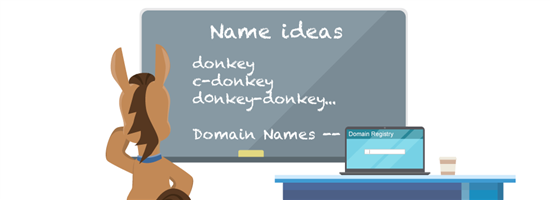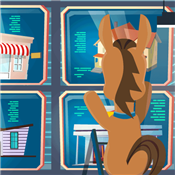How to Start a Microbrewery: Beginner's Guide
For enthusiastic home-brewers, starting a microbrewery can seem like a dream. Find out how to join this fast-growing, community-driven field in our step-by-step guide.
 |
| © CreditDonkey |
- Do Some Preliminary Research
- Settle the Upfront and Ongoing Costs
- Finalize Your Business Plan
- Name Your Business and Secure Your Domain
- Choose Your Business Structure
- Get Necessary Permits, Licenses, and Insurance
- File for an EIN
- Set Up Business Bank Accounts
- Hire Labor & Management
- Check the Boxes on All Safety Requirements
- Market Your Business
- Essential Tips for Starting a Microbrewery
If you've been in a bar recently, you might have noticed:
The craft beer industry has skyrocketed. And with no signs of slowing down.
Luckily, it's easier than ever to dip your toes into microbrewing.
In this article, we cover 11 necessary steps to start your own microbrewery and set it up for long-term success. Keep reading for tips, info on small business grants, and more.
1. Do Some Preliminary Research
Beer drinkers are increasingly savvy about the beer they drink.
Learning as much as you can about the craft beer market will set you up for success:
Who is your target audience? Until you expand into a brew or pub, most microbreweries only sell to distributors.
How much can you charge as a microbrewery? Make sure your pricing is enough to recover your ongoing costs with a profit margin. If allowed in your state, you can also self-distribute to reduce costs.
Where will your business operate from? One of the largest ongoing costs is rental space. You can rent a physical location or, alternatively, start a "nano" brewery in your garage.
How might your microbrewery grow? Consider new opportunities to bring in customers and foster brand loyalty: open a tasting room, start a pub, sell merch, or even add trivia nights
2. Settle The Upfront And Ongoing Costs
Costs will fluctuate based on your business model and location, among other factors. Be prepared for the following upfront and ongoing costs in running your microbrewery:
Upfront Costs
| Upfront Expense | Low End | High End |
|---|---|---|
| Licenses and Permits | $6,477.00 | $16,265.00 |
| Buildout cost | $16,000.00 | $16,000.00 |
| Utility Deposits | $2,000.00 | $2,000.00 |
| Flooring | $32,000.00 | $32,000.00 |
| Lab Equipment | $2,000.00 | $2,000.00 |
| Turnkey System Cost | $60,000.00 | $60,000.00 |
| Legal | $5,000.00 | $5,000.00 |
| Total Upfront Costs | $123,477.00 | $133,265.00 |
Ongoing Costs (Annual)
| Ongoing Expense | Low End | High End |
|---|---|---|
| Monthly Rent | $16,128.00 | $26,880.00 |
| Brewmaster Salary, Benefits | $49,417.00 | $53,390.00 |
| Beer Tax | $10,500.00 | $10,500.00 |
| License fee | $300.00 | $400.00 |
| Ingredients | $70,000.00 | $70,000.00 |
| Packaging | $49,500.00 | $49,500.00 |
| Marketing | $30,000.00 | $30,000.00 |
| Utilities - Water | $1,058.40 | $1,622.96 |
| Utilities - Electricity | $2,331.00 | $4,503.00 |
| Utilities - Natural Gas | $287.70 | $168.60 |
| Insurance | $900.00 | $900.00 |
| Total Ongoing Costs | $230,422.10 | $247,864.56 |
Small businesses can apply for a variety of grants and loans to help with ongoing expenses.. The Small Business Administration (SBA) offers several desirable loans and grants for businesses that can get you anywhere from $500 to $500,000.
In addition, the Brewers Association, which supports small and independent brewers, gives out funding to support their members. Every year, they hand out more than $2 million in funding.
3. Finalize Your Business Plan
 |
| © CreditDonkey |
A business plan is essential to the growth of your microbrewery and should include:
- Your company goals
- The organization of your management team
- Finances and revenue projections
- Market research and target audience(s)
Take into account any start-up costs, as well as fixed, ongoing costs, and how long it may take you to break even.
Being an entrepreneur has many long-term benefits:
- Flexibility: work your own hours.
- Be your own boss: working for yourself means you make the decisions.
- Pursue your passion: you can go after your own dreams.
- Set your own goals: you decide the pace of success and the goals you achieve.
- Financial freedom: over time, you will have the financial freedom to create the life you want.
4. Name Your Business And Secure Your Domain
 |
| © CreditDonkey |
The name of your business serves as the customers' first impression of your business. Ask yourself these questions when thinking of a name:
- Is it unique or meaningful to you?
- Is it easy to say and read?
- Is it already registered to any high-profile business?
Once you've chosen, be sure to secure a website domain with the same name (consistency is key for branding).
Don't forget: A professional email address ties your branding together and boosts credibility. Here's how to get yours set up.
5. Choose Your Business Structure
Establishing your business as a legal entity allows you certain perks, like protecting your personal assets, the ability to build business credit, and access to tax benefits.
Not sure which business entity to adopt? Here are the main differences:
Corporation: Legal entity meant to conduct business; no personal liability, but detailed record-keeping required.
Limited Liability Company: Hybrid of corporation and partnership; profits can be passed tax-free to owners with no personal liability
Partnership: Business involves two or more people who agree to share in profits
Sole Proprietorship: No employees; owner is personally liable for the business's finances
DBA: aka "Doing Business As"; needed if you're an unregistered business operating under a name that is not your own legal name
Take these factors into consideration:
- Liability: Pick an LLC or corporation for personal liability protection.
- Business taxes: Do you prefer to be taxed as a business or on the personal level?
- Your industry: Companies that carry a higher risk tend to form LLCs, while industries needing flexibility may form partnerships.
6. Get Necessary Permits, Licenses, And Insurance
Without the proper permits and licenses, your business could face heavy fines or even be shut down.
Be sure to secure the following licenses before you being operating as a business:
State and Local Licenses: Local and state regulations can vary by region. Before starting your business, check with your city clerk's office about the licenses you need, including a Brewer's Notice.
Then, check with the Small Business Association (SBA) for more information.
Insurance: Required for you to legally operate, insurance also protects you and your business from liability.
Start with General Liability Insurance and upgrade later, especially if you're not sure what risks you need to protect against.
If you hire employees, determine whether workers compensation is legally required in your state.
Certificate of Occupancy: This confirms that your business meets all codes and regulations.
If you plan to lease your location, your landlord will be responsible for acquiring the CO.
If you'll own the location, you will be responsible for obtaining the CO from local government officials.
Sales Tax: Since your business will provide goods/services, you may be required to collect sales tax. Your local SBA can help.
7. File for an EIN
 |
| © CreditDonkey |
An EIN, or employer identification number, is a unique, nine-digit number that lets the IRS identify you as a taxpayer and keep track of your business' tax reporting.
To get an EIN, you'll need to provide business information, including your official business name. You can apply online or call the IRS directly.
After filling out the form, you'll immediately be assigned your EIN.
In addition to being recognized as a taxpayer, your EIN enables you to hire employees, open a business banking account (more on this below), and even prevent identity theft.
Your business needs an EIN if:
- You have employees.
- Your business operates as a corporation or partnership.
- You file employment, excise, alcohol, firearms, and tobacco taxes.
- Your business withholds taxes, other than wages, paid to a non-resident alien.
8. Set Up Business Bank Accounts
 |
| © CreditDonkey |
A business bank account is essential to keep track of all business expenses. It also keeps business costs separate from personal costs so any personal assets (like a car or home) are protected if you get sued.
In addition, having a business account will make filing your taxes much easier and faster. Many banks offer affordable business accounts for business owners, even with added perks and sign-up bonuses.
Once your accounts are set up, using an accounting software can help you keep tabs on everything related to business finances. You can customize invoices, track your accounts, and some even come bundled with payroll features.
9. Hire labor & management
You'll need a good-sized team to have a thriving microbrewery; here's who you will need on staff:
Brewmaster: This is one of the most important people on staff. They oversee the entire brewing process and supervise all others. At large breweries, they can make upwards of $100,000, but at smaller craft breweries, they can make $40,000 to $50,000.
Shift Brewer: A shift brewer helps the brewmaster with the brewing process. At smaller breweries, you may pay a shift brewer around $20,000.
Brewer's Assistant: This worker helps with cleaning brewing equipment, filling kegs and more. Their salary can vary based on the size of your business.
Beer Packager: A packing technician handles the packaging and bottling of your beer (this includes bottles, kegs and more). They also operate the machinery for packing and can earn around $25,000 a year.
Beer Cellar Manager: This employee will manage the cooling parts of your business day-to-day. They earn anywhere from $30,000 to $40,000 yearly.
Brewpub Server: If you open a brewpub, you will need wait staff. Servers are paid hourly and the range will depend on market value in your neighborhood.
The size of your profit will depend on the size of your brewery, as well as the competition in your market. Most breweries will turn about 10 percent in profit in their first few years.
However, fluctuating costs of grains for brewing and raising rental space prices can cut into your profits. In addition, you will need to reinvest some of your profit each year back into your business to keep growing and stand out from your competition.
10. Comply With All Food & Labor Safety Requirements
While the Food and Drug Administration, or FDA, has jurisdiction over breweries, the TTB (Alcohol and Tobacco Tax and Trade Bureau) will oversee licensing and other compliance issues. Here's what you need to keep in mind:
Sanitation: Employees must wash their hands, wear hairnets (if applicable) and handle food and utensils properly.Train your employees regularly on food safety handling and keep records of the training.
Keep your brewery clean and organized: Keep everything labeled and dated. And of course, make sure your brewery is clean and without mold, grease, and buildup.
Manufacturing practices: Your method for storing food products (like grains or hops) is subject to sanitary regulations.
Paperwork: Breweries are required to register with the FDA as a food facility and renew that registration every two years. Make sure you have the up-to-date FDA paperwork on hand for inspections, including all your other business paperwork.
Bulk sales: Many breweries will sell their byproducts, like spent grain, as animal feed. That process is also subject to human food safety requirements.
Food services: if your microbrewery sells food or packaged goods on-site, it's subject to federal, as well as local regulations.
11. Market Your Business
 |
| © CreditDonkey |
Craft beer is booming, and with so much competition in each market, standing out from the crowd can be difficult.
Here's how to market your microbrewery, no matter your budget:
Leverage social media: Instagram is one of the most powerful platforms for craft breweries; offer a behind-the-scenes look at your brewery and more exclusive insights. You can turn your posts into targeted ads, too.
Collaborate with local businesses: Word-of-mouth is an effective marketing tactic for craft breweries. Consider partnering with local businesses for cross-promotion.
Engage with the community: Work with your local organizations and chambers of commerce to attend community festivals, block parties, food truck festivals and more.
Branch out: Consider expanding your business to include special events to bring in new customers. For example, many breweries will host trivia or karaoke nights.
Leverage email marketing: Newsletters can have great ROI for your microbrewery. Take time to craft your message and think about what you want to highlight, like a new release or a popular brew on tap.
Essential Tips for Starting a Microbrewery
Before starting your microbrewery, consider these tips:
- Work on defining your brand: As a microbrewery, your brand is one of the most important elements of your business. Make sure your audience knows how your business and your beer differs from others. Craft beer customers value authenticity.
- Grow your market: When you're ready to grow your business, seek out distributors that can sell your beers to a much larger market. Even if they can't help you right away, they might direct you to someone who can (or even offer advice).
- Expand your business: Your brewery can grow by implementing a number of side businesses, like starting a taproom or restaurant, for example. Renting the space out for events can also be profitable.
Hear from the Experts
CreditDonkey asked expert microbrewers for their opinion on the challenges of starting a microbrewery.
Here's what they had to say:
Bottom Line
For many brewers, brewing beer is a rewarding calling, and starting your own microbrewery can be the first step in a lifelong passion project.
Write to Samantha Tatro at feedback@creditdonkey.com. Follow us on Twitter and Facebook for our latest posts.
Note: This website is made possible through financial relationships with some of the products and services mentioned on this site. We may receive compensation if you shop through links in our content. You do not have to use our links, but you help support CreditDonkey if you do.
|
|
|









